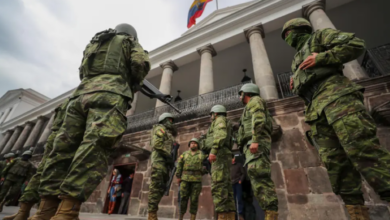Venezuela after Chavez: some contradictions
Listen this article
In the midst of the achievements of the revolutionary process, the extreme conditions and the rapid regression of what had been achieved stand out

With all the bombing of the media around a 'humanitarian crisis' in Venezuela, recent tensions on the border between Venezuela and Colombia, statements about 'military options' and coup attempts, it was difficult to assess what to do when you return to the country for the first time. I waited for five years.
Leer en español: Venezuela después de Chavez: algunas contradicciones
I had imagined a vanguard country, especially because I arrived in Caracas on March 5. This was the day after Juan Guaidó, the opposition leader and self-proclaimed interim president, returned to the country and the anniversary of the death of Hugo Chávez, the predecessor of the elected president Nicolás Maduro.
However, the capital was remarkably calm. It was carnival time, one of the most important holiday periods for Venezuelans and, like every year, most Venezuelans preferred to spend it on the beach or on a family visit.
During the next two weeks, the relative calm and stability in a country with (in theory anyway) two presidents in competition and days of power outages with consequences for water supply and telecommunications were notorious.
Maybe you're interested in reading: The end of Guaidó: this decision would distance him from politics
Extreme contradictions
Equally striking were the extreme contradictions between the achievements of the revolutionary process of the last two decades and the rapid retreat of many of these achievements as a result of the recent deep economic crisis.
During the boom years of the Chávez government, redistributive policies led to the poorest sectors gaining access to basic products, branded products, and electronic home products that had always been beyond their reach.
That began to change after Chávez's death. The escalation of the economic war against the Maduro government made some goods scarce.
Nowadays it is easy to obtain most of these goods and, in US currency, at relatively low prices. This was recently declared by The Economist, which ranked Caracas as the cheapest city in the world. However, hyperinflation causes workers' wages to plummet, which means that most of the goods are not cheap for the majority of people paid in Bolivars, the local currency.
Venezuela's current minimum wage, the lowest in the region, is less than USD $ 6 a month, enough to buy an egg a day. Even skilled workers, many of whom are severely affected as a result of the massive expansion of access to university education under Chávez and Maduro, earn little more than USD $ 10 or USD $ 20 per month.
Technology companies that returned to Venezuela, despite the current economic crisis, are benefiting from this combination of highly skilled and poorly paid workers.
The search for cheaper products with steadily rising prices is a daily challenge that is made even more difficult by the impact of political events.
After the closing of the border between Venezuela and Colombia at the end of February, the prices of some goods that had been moved to the border before being sold more expensively fell. During the blackouts, prices rose again, as food was spoiled by lack of cooling.
Obtaining goods and services with bolivars is increasingly difficult. For bus trips by land, which generally must be paid in cash, tickets must be packed. There is a shortage of banknotes and banks limit payments to less than one dollar per day. Flight dealers with banking devices and credit cards have become commonplace and many prefer to accept dollars to solve this problem.
In border states such as Apure and even Barinas, several hours away from the border, Colombian pesos are accepted and, sometimes, they are preferred because the value of Bolívar decreases daily.
LatinAmerican Post | Rafael Hernández
Translated from "Venezuela después de Chávez: algunas contradicciones"





